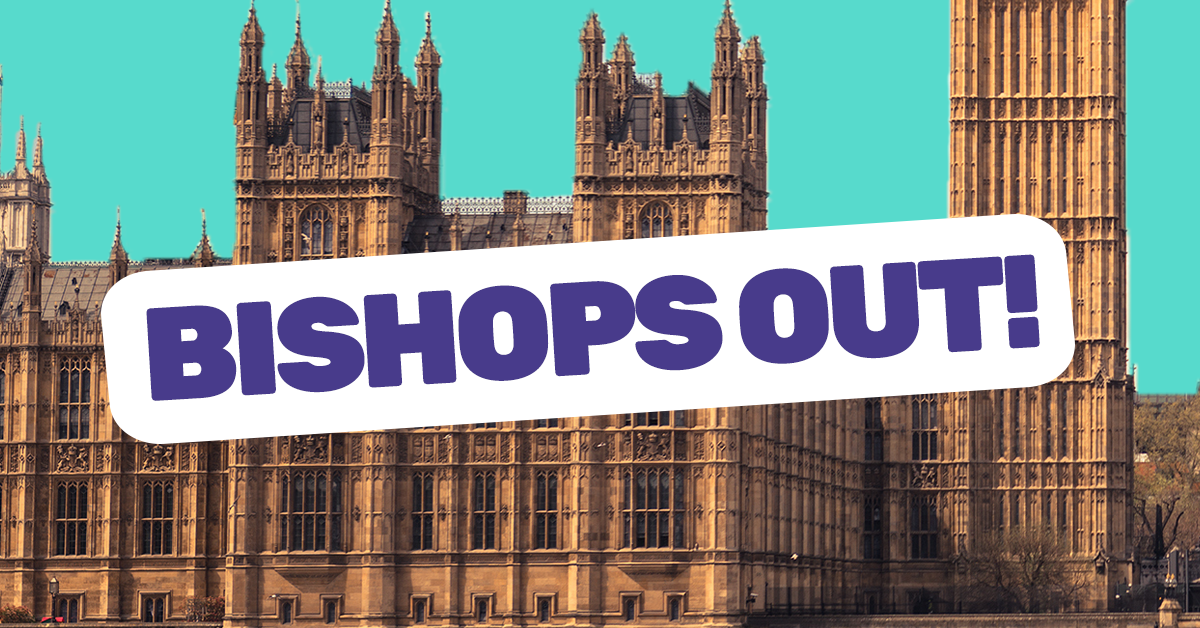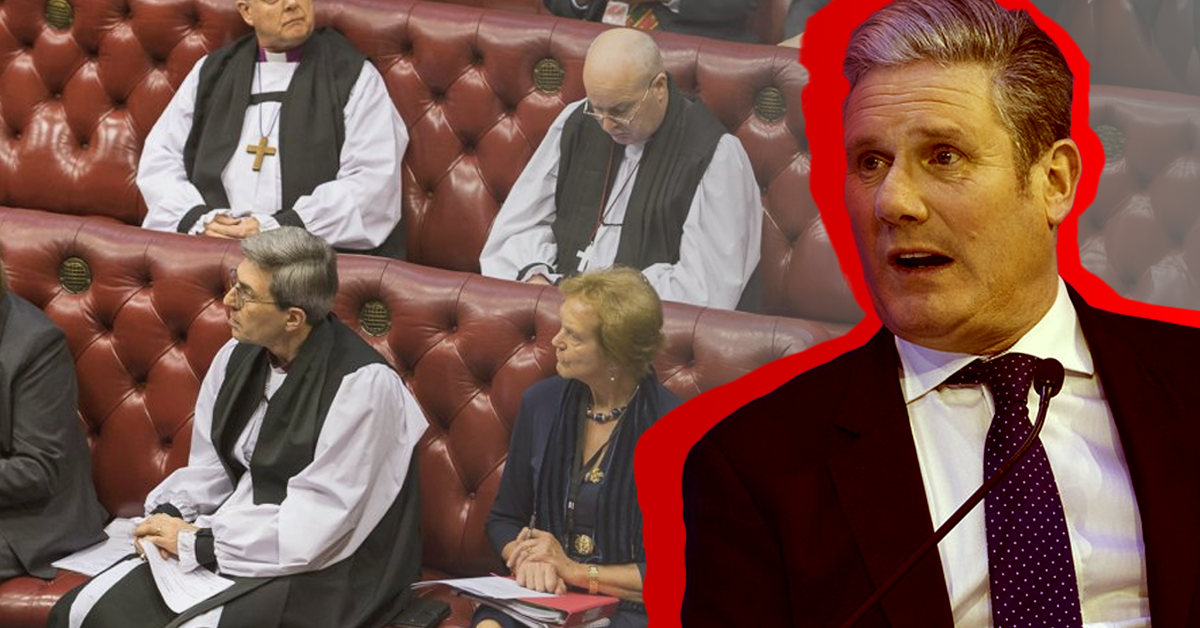
In the decades-long debate about the structure and function of the UK’s political institutions, reform of the House of Lords has often loomed large, and as part of that, addressing the undemocratic practice of reserving parliamentary seats for officials of England’s state church.
Recent developments in the Isle of Man, with calls to remove the Bishop of Man and Sodor from the House of Keys, should reignite this conversation. The Manx parliament is the only democratic assembly on earth, besides the UK Parliament, where Anglican bishops sit or vote as of right.
In the UK Parliament, votes from these priests – collectively known as the Lords Spiritual – have been decisive in at least nine parliamentary votes in recent years, including on amendments to expand religious control over state schools, or which widened religious loopholes to our equality laws.
Humanists UK’s stance is clear: these automatic seats are incompatible with a modern, plural society. Over half the UK identifies as non-religious, yet 26 seats are granted to a single religious organisation, resembling a party without electoral mandate.
Given that the presence of unelected clerics of any kind in Parliament is inherently undemocratic and unrepresentative, and no good arguments have ever been made for protecting the current arrangement, it seems like something that should feature more prominently in the UK debate on constitutional reform, including in the run-up to a general election. But will it?
The last time the public was consulted on reform of the House of Lords, the largest single issue that citizens submitted to the deputy prime minister consultation was the presence of unelected bishops. But politicians, unlike the public, tend to neglect it.
Election issue?
An election is coming. While public appetite for a more democratic and representative system grows, with surveys pointing towards a desire for secular government, political promises remain muted. Labour’s past support for proposals like a Senate of Nations and Regions might be seen to indicate an appetite for reform, but it is still unclear if this commitment will make it to print when election time comes around, or how prominently it would feature in their domestic agenda should they come to power.
Other parties, like the Greens, the SNP, and the Lib Dems, favour reforming or replacing the House of Lords as a matter of party policy. The common thread in these proposals is a push towards a more democratic and representative Parliament, and to better reflect the diverse and evolving nature of British society. But we still need to urge them to make support for a more secular approach to governance part of their election promises.
Demographic changes add urgency to reform
While Lords reform, particularly the abolition of the Lords Spiritual, has not historically been a front-and-centre issue in UK general elections, major ongoing demographic shifts and vastly changed public attitudes towards religion in politics means there is no time to waste on pursuing constitutional reform.
Pragmatic proposals for sensible constitutional reform rarely make for the sort of sensational, high-drama, flashy political spectacle we have become used to in recent years. But such reforms are an essential duty of governments with a genuine commitment to public service and which wish to preserve, enrich, and uphold democratic values and institutions.
Policymakers are surely already alive to the demographic time bomb facing churches – with fewer than 1% of young adults identifying as Anglican in recent British Social Attitudes Surveys. The growing gap between a truly representative politics and the situation we have now will inevitably mean the issue will become more and more unsustainable. Failure to act on this divergence will also mean, inevitably, that wider social issues will continue to plague the established Church of England.
Either way, for Humanists UK, the general election offers a real opportunity for humanists to rally around the idea of a better way of doing politics, and to make the case for sensible reforms to politicians at a time when they’re unusually keen to listen. A good place to start is with writing to your prospective parliamentary candidates – incumbent and opposition – to ask after their views.
Between now and the day, we’ll be offering our members and supporters ways to get in touch with their local candidates about our campaigns and many of the issues that matter to humanists.
The campaign season will also be an opportunity for political parties and their candidates to demonstrate their commitment to a better, more modern, and more democratic politics which represents the reality of today’s diverse and pluralistic society.
26 bishops reliably vote against LGBT rights, abortion rights, and fair admissions in schools. Help the campaign by writing to your MP today.
Notes
For further comment or information, media should contact Humanists UK Director of Public Affairs and Policy Kathy Riddick at press@humanists.uk.
Read more about our work on bishops in the House of Lords.
Humanists UK is the national charity working on behalf of non-religious people. Powered by 120,000 members and supporters, we advance free thinking and promote humanism to create a tolerant society where rational thinking and kindness prevail. We provide ceremonies, pastoral care, education, and support services benefitting over a million people every year and our campaigns advance humanist thinking on ethical issues, human rights, and equal treatment for all.
Reports of the All-Party Parliamentary Humanist Group
Humanists UK is secretariat to the All-Party Parliamentary Humanist Group (APPHG), a group of MPs and peers who meet to discuss humanist issues and support many of the same causes we do. We provide administrative support and policy expertise to the group’s own research work. Some of the APPHG’s published reports are collected below.
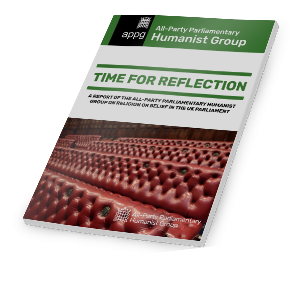
Time for Reflection
The All-Party Parliamentary Humanist Group examined the treatment of religion or belief in the UK Parliament, including practices like appointing bishops to the House of Lords and use of ‘prayer cards’.
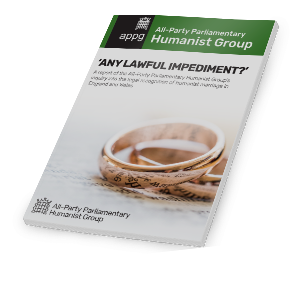
Any Lawful Impediment?
The All-Party Parliamentary Humanist Group published this report on its inquiry into delays legalising humanist marriage in England and Wales.
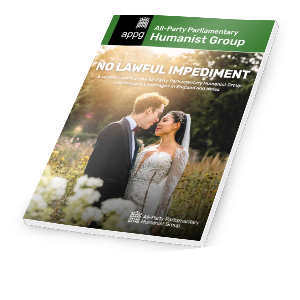
No Lawful Impediment
An examination of the case for legal marriage reform, including humanist marriages, in light of the then-ongoing Law Commission review of domestic marriage law .

